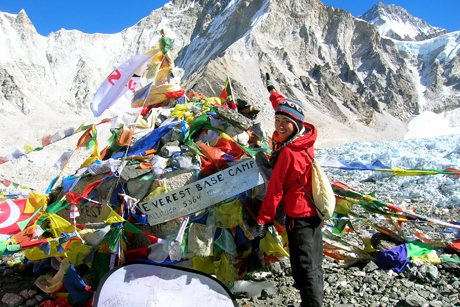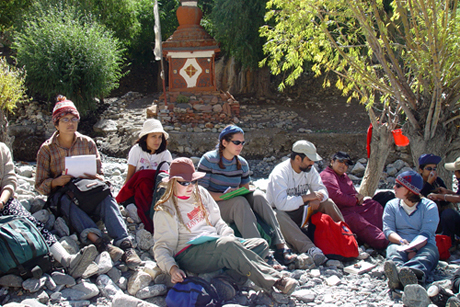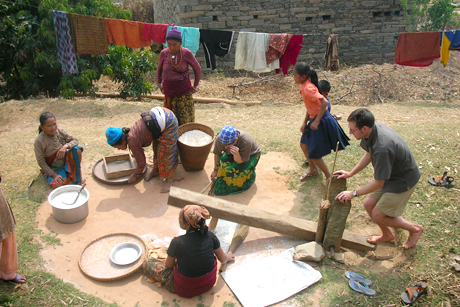Nepal program marks 20 years of immersive experience
By Olivia M. Hall



The Cornell Nepal Study Program (CNSP) has given some 200 American undergraduates and graduate students semester- and year-long immersive experiences over its 20-year history.
Founded in 1993 in partnership with Nepal’s Tribhuvan University and based in the medieval town of Kirtipur, Cornell’s signature study abroad program also has provided residential fellowships to local students and helped more than 200 Tribhuvan students complete their master’s degrees.
“From the outset, this program was intended to involve equal numbers of Nepalese and American students,” said anthropology professor Kathryn March, who started CNSP with then-director of Cornell Abroad Ben DeWinter, in-country director Banu Oja and Tribhuvan sociology/anthropology department head Om Prasad Gurung, Ph.D. ’96. “Our goal has been to prove that a really rich international opportunity for Cornell students can occur best in this kind of mutually beneficial collaborative relationship.”
With this approach, “CNSP pioneered engaged learning and research well before the term was coined,” current Cornell Abroad director Marina Markot noted.
Students share dormitory rooms with their Nepalese peers, “an extraordinarily interesting and diverse group of people,” March said. “They come from all over Nepal and all sorts of ethnic and caste communities.”
Together the students take English-taught courses, taught by Tribhuvan senior professors of botany and sociology/anthropology and by visiting Cornell faculty, on various aspects of Nepalese society. While U.S. participants study the Nepali language – building on lessons at Cornell with Nepali instructor Shambu Oja – their roommates work on their English.
Equally important, March said, are rich co-curricular activities such as yoga and dance workshops and regular culture nights, during which Nepalese and American students teach each other about Halloween, Valentine’s Day and the color festival Holi.
Gregory Blocki ’12, a teaching associate and residential coordinator for CNSP, said the program was transformative for him as a student in 2011 and praised its “unique take on cultural engagement, [where] students engage with and form close bonds with a real Nepali community.”
A two-week study tour with village homestays, a mountain trek, apprenticeships around Kirtipur and other activities take students out into Nepalese society.
“I befriended a family in Kirtipur and went through a ceremony where I actually became a family member,” said Heidi Kretser ’95, Ph.D. ’08, who attended CNSP’s first year. “I love them dearly. We continue to communicate by email.”
The program remained open during the Nepalese Civil War from 1996 to 2006, although safety concerns restricted student travel. “[The war] caused lots of changes in the regular schedules of our program,” Banu Oja said. “However we survived through.”
Students cap off the semester with a four-week internship or conducting independent research on topics as diverse as mental health, tourism, household energy use, captive elephants, breastfeeding, honey, the caste system and tattoos in regions across the country.
Abraham Zablocki, Ph.D. ’05, had Nepal in his sights when he came to Cornell to work with March. In 1994, he researched globalization’s effects on Tibetan exiles there.
“Going to Nepal was exactly what I wanted – having one foot in each world, I was really happy to do what amounted to pre-dissertation fieldwork,” said Zablocki, who is still friends with his Nepali roommate from CNSP’s first year.
The program continues to evolve. Addressing student interest in short-term, more intense study abroad options, CNSP is adding two new summer undergraduate and professional graduate programs.
Throughout the program, “the goal is to let students engage fully, in a place just about as different as a place could be from the U.S., and still allow them to [work] at the highest possible level,” March said.
Justine Lewis, MPA ’13, spent the spring 2013 semester in Nepal. “I got a rich, vibrant and rigorous academic experience,” she said, and interning with a non-governmental organization in Kathmandu “helped shape my aspirations to be a Foreign Service officer.”
Olivia M. Hall, Ph.D. ’12, is a freelance writer. Chronicle staff writer Daniel Aloi contributed to this report.
Media Contact
Get Cornell news delivered right to your inbox.
Subscribe